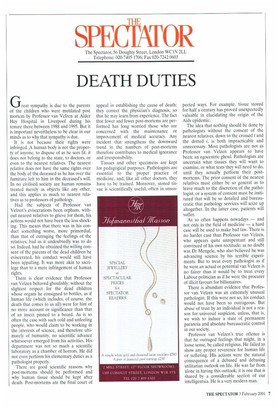SPECIrATOR
The Spectator, 56 Doughty Street, London WC1N 2LL Telephone: 020-7405 1706; Fax 020-7242 0603
DEATH DUTIES
Great sympathy is due to the parents of the children who were mutilated post mortem by Professor van Velzen at Alder Hey Hospital in Liverpool during his tenure there between 1988 and 1995. But it is important nevertheless to be clear in our minds as to why that sympathy is due.
It is not because their rights were infringed. A human body is not the property of anyone, to dispose of as he sees fit: it does not belong to the state, to doctors, or even to the nearest relatives. The nearest relative does not have the same rights over the body of the deceased as he has over the furniture left to him in the deceased's will. In no civilised society are human remains treated merely as objects like any other, and this applies as much to nearest relatives as to professors of pathology.
Had the subjects of Professor van Velzen's eviscerations been orphans, without nearest relatives to grieve for them, his actions would not have been the less shocking. This means that there was in his conduct something worse, more primordial, than that of outraging the feelings of the relatives, bad as it undoubtedly was to do so. Indeed, had he obtained the willing consent of the parents of the dead children he eviscerated, his conduct would still have been appalling. It was more akin to sacrilege than to a mere infringement of human rights.
There is clear evidence that Professor van Velzen behaved ghoulishly, without the slightest respect for the dead children whose organs he consigned to bottles, as if human life (which includes, of course, the death that comes to us all) were for him of no more account or significance than that of an insect pinned to a board. As is so often the case with such cold and unfeeling people, who would claim to be working in the interests of science, and therefore ultimately of humanity, no scientific advance whatsoever emerged from his activities. His department was not so much a scientific laboratory as a chamber of horrors. He did not even perform his elementary duties as a pathologist properly.
There are good scientific reasons why post-mortems should be performed and why human tissue should be kept after death. Post-mortems are the final court of appeal in establishing the cause of death; they correct the physician's diagnosis, so that he may learn from experience. The fact that fewer and fewer post-mortems are performed has long worried those who are concerned with the maintenance or improvement of medical accuracy. Any incident that strengthens the downward trend in the numbers of post-mortems therefore contributes to medical ignorance and irresponsibility.
Tissues and other specimens are kept for pedagogical purposes. Pathologists are essential to the proper practice of medicine, and, like all other doctors, they have to be trained. Moreover, stored tissue is scientifically useful, often in unsus pected ways. For example, tissue stored for half a century has proved unexpectedly valuable in elucidating the origin of the Aids epidemic.
The idea that nothing should be done by pathologists without the consent of the nearest relatives, down to the crossed t and the dotted i, is both impracticable and unnecessary. Most pathologists are not as Professor van Velzen appears to have been: an egocentric ghoul. Pathologists are uncertain what tissues they will want to examine, or what tests they will need to do, until they actually perform their postmortems. The prior consent of the nearest relatives must either be so general as to leave much to the discretion of the pathologist, or a system of consent must be instituted that will be so detailed and bureaucratic that pathology services will seize up altogether. In the latter case, patients will suffer.
As so often happens nowadays — and not only in the field of medicine — a hard case will be used to make bad law. There is no harder case than Professor van Velzen, who appears quite unrepentant and still convinced of his own rectitude; as no doubt was Dr Mengele, who also believed he was advancing science by his terrible experiments. But to treat every pathologist as if he were an actual or potential van Velzen is no fairer than it would be to treat every Labour politician as if he were the procurer of illicit favours for billionaires.
There is abundant evidence that Professor van Velzen was an extremely unusual pathologist. If this were not so, his conduct would not have been so outrageous. But abuse of trust by an individual is not a reason for universal suspicion, unless, that is, we wish to induce a state of permanent paranoia and absolute bureaucratic control in our society.
Professor van Velzen's true offence is that he outraged feelings that might, in a loose sense, be called religious. He failed to show any proper reverence for human life or suffering. His actions were the natural consequence of a debased and debasing utilitarian outlook on life. He was far from alone in having this outlook; it is one that is shared by a considerable section of our intelligentsia. He is a very modern man.


























































 Previous page
Previous page